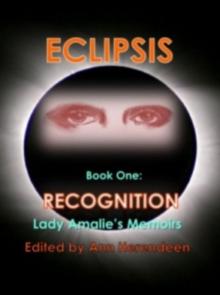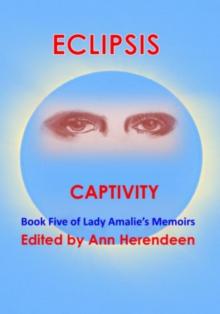- Home
- Ann Herendeen
Captivity
Captivity Read online
ECLIPSIS
CAPTIVITY
Book Five of Lady Amalie’s memoirs
by Amalie, Lady Aranyi
edited by Ann Herendeen
Copyright © 2011 by Ann Herendeen
This book is a work of fiction. Names, characters, places and incidents are either products of the author’s imagination or used fictitiously. Any resemblance to actual events, locales, or persons, living, dead, or undead, is purely coincidental. All rights reserved. No part of this publication can be reproduced or transmitted in any form or by any means, electronic or mechanical, without permission in writing from the author or publisher.
Smashwords Edition: November 2011
Cover image by Danielle Jacobs with T.T. Thomas
Table of Contents
Also by Ann Herendeen
About the Author/Editor
Dedication
CHAPTER 1
CHAPTER 2
CHAPTER 3
CHAPTER 4
CHAPTER 5
CHAPTER 6
CHAPTER 7
CHAPTER 8
CHAPTER 9
CHAPTER 10
CHAPTER 11
CHAPTER 12
CHAPTER 13
CHAPTER 14
CHAPTER 15
CHAPTER 16
CHAPTER 17
Preview: RETRIBUTION
ALSO BY ANN HERENDEEN
Harper Paperbacks (Kindle and Nook versions also available):
Phyllida and the Brotherhood of Philander (2008)
Pride/Prejudice (2010)
Lambda Literary Award finalist, Bisexual Fiction category
E-Books
ECLIPSIS: Lady Amalie’s Memoirs
Book One: Recognition
Book Two: Choices
Book Three: Wedding
Book Four: Birth
Book Five:Captivity
Book Six: Retribution (December 2011)
Short Story
A Charming Ménage
In Gay City Volume 4: “At Second Glance”
ABOUT THE AUTHOR/EDITOR
Ann Herendeen is the author of two Harper Paperbacks: Phyllida and the Brotherhood of Philander (2008); and Pride/Prejudice (2010), a Lambda Literary Award finalist for Bisexual Fiction. Her short story, “A Charming Ménage,” will appear in the 4th GAY CITY anthology: At Second Glance, published later this year. She lives in Brooklyn. www.annherendeen.com
To copy editors, the unsung heroes
CHAPTER 1
“Halt!” The shout shattered the stillness of the summer morning, ringing out from the edge of the forest that narrowed our trail to single file. “If you value your lives, halt and give up your weapons!”
They were on us before anyone had a chance to react. Bandits—an army of them, swarming silently now, down from the steep embankments on both sides of the trail. With swords drawn, knives and daggers at the ready, in belts and boot tops and in teeth, the outlaws forced our little group to a standstill, unhorsing and disarming our four guards without having to strike a blow. We were neatly ambushed, at this natural choke point along the trail to Aranyi.
During the seconds of slow motion that precede disasters, I had time for one session of “This is all my fault.” How many of Dominic’s warnings had I laughed off in the past six years? How many screaming fights over my Terran foolhardiness had we resolved, in our enjoyably combative marriage, with even louder reconciliations? Now, incited by corrosive jealousy, I had finally done it—put my children at risk.
I had been riding uncovered in the summer sunshine, soaking up the energy and the warmth, my inner eyelids lowered in protection. But as if to emphasize my carelessness, I had erected strong shields around my crypta, blocking all incoming thoughts. Telepathy can be a burden on the spirit; I had not wanted to spend a long day’s ride listening to any resentful thoughts I might pick up from the guards or the women, annoyed at my sudden decision to travel home without my husband or a suitable escort.
If only I had not shielded my mind, I must have sensed the eager anticipation of so many hostile men lying in wait. Surely, I thought, as tears stung my eyes, I would have become aware of the bandits while we were far enough away that we could have turned around, avoided the trap, made it back to safety. A gift, we ‘Graven call crypta, a real justification for our noble status. Yet I had scorned to use my gift, for silly personal considerations, when it would have been most valuable.
Then the clock was running again in real time. The barriers removed, my crypta merely confirmed what my eyes and ears had already shown me. To a man, the bandits projected thoughts of triumph: relief that the number of my guards was as small as they could have wished; an edgy confidence now that the first big step of some bold plan had been taken.
I looked first for Val. My son, a couple of months short of his second birthday, did not yet know something was wrong. He was half-asleep, dozing in the carrying pack on the back of his nursemaid, Isobel. The slow jogging pace had worked like a lullaby on my usually restless, observant boy. With any luck he might remain blissfully ignorant of our close call.
Jana, my daughter, was all too well aware of the situation. I could sense her mixture of fear and excitement at this unexpected development. Everything military and violent fascinated her. At five-and-a-half, she rode her own pony, and had been accepted into the good graces of the leader of our little troop, an avuncular and experienced guard who enjoyed answering her barrage of questions. Now she displayed the coolness of a trained warrior, looking down without expression at her friend and his fellow guard, both lying prone in the dirt, their swords and daggers appropriated, each with a bandit’s muddy boot pressing on his neck. Jana, as her father had taught her, made no sound and sat very still, doing nothing to attract attention in a battle she could not win.
I did not have that luxury. It went against my nature, but I hoped that if I identified myself, let the outlaws know the prize they had inadvertently taken, they would leave us in peace.
They should know without my having to say anything. If my silver inner eyelids were not reason enough, there was another forceful argument for the bandits to treat us with respect. The guards’ gray uniforms and our saddle blankets, my cloak and the household women’s dresses, all had the Aranyi cipher woven into their fabric in heavy, contrasting black. In a world where literacy is rare, the stylized “A” encircled by the Greek meander design proclaims Aranyi to even the most ignorant backwoodsman. These northern borderlands, including the trail we had been riding along and the woods in which our captors had been lying in wait, belong to the Aranyi Realm, whether through outright ownership, or by alliance.
No one, not even desperate men, could wish to start a war with Aranyi. All it would earn them was certain defeat, at great cost. While I supposed the bandits would rob us after catching us so easily in their trap, they would know not to kill or hurt anyone, guard or maid, who could claim my husband’s protection.
I looked behind me. Our two rear guards had suffered the same fate as the two in front: disarmed, forcibly dismounted and pressed face down in the mud. One was struggling. Wilmos, the housekeeper’s son, the one man from our household left to guard me in Dominic’s absence, wanted to uphold Aranyi honor. I could read the thought in his head, and I acted at once to stop it.
“No dead heroes,” I shouted. My voice sounded weak and quavering in the unnatural silence of so many armed men holding themselves in readiness.
Better a live coward than a dead hero. I had remembered the old Terran proverb when we had been preparing to set out from Stefan Ormonde’s manor, and had tried to put a positive interpretation on it. One must never imply that Eclipsian men lack courage, not even in casual talk. I had merely quoted the last two words as a warning to the four men who would guard us,
explaining that I did not expect them to risk their lives on the ill-advised journey of a disobedient wife. “Please,” I said, “dead heroes cannot help me.”
The bandits were watching me after my outburst, smirking at my high voice and small size. I pitched my voice as low as it would go. “There is no need to fight. I am sure these good men—” I tried not to sound too sarcastic. “—will not wish to harm anyone in the service of ‘Gravina Aranyi.” I stressed the name and gulped in a shaky breath.
There was no reaction. As the ominous silence continued, I became increasingly worried. My initial panic had been controlled by the thought that once they knew who I was we would be safe. My announcement of my identity had not produced the result I had hoped for. They believed me—I could not doubt the evidence of my crypta—but there was no fear or awe. In fact, it was as if they had expected to catch ‘Gravina Aranyi, and were experiencing quiet satisfaction in success.
I reached my left hand slowly and furtively toward the sheath on my belt, hoping to extract my prism-handled dagger without attracting attention. With the bright sunlight, I would have the full range of power at my disposal. My gift should allow me, a small middle-aged woman, to match strength with a band of outlaws. Or so I hoped. It was best to have the dagger ready, in case an opportunity arose to use it.
Forty-some men. I counted quickly, trying to calm myself by a simple task. And there were more I couldn’t see, lurking behind the trees. In my innocent imagining, fed by Terran romances and Holonet dramas, “bandits” had sounded glamorous, like pirates. The illusion died a quick death. The men were filthy, their stink, even outdoors, enveloping our little group in a miasma of foulness in the warm summer air. Their hair was long and matted, greasy beards and mustaches partially concealing scarred and spotted faces. They wore rags, the remains of what had once been ordinary shirts and breeches, now held together with pieces of rope or cord, encrusted skin showing through large rents and holes. Only their weapons and the leather scabbards and sheaths were in good condition, the essential tools of their “trade” kept in top working order.
My moment of confidence died a quick death. Forty men, maybe closer to fifty, were too many for me to overpower all by myself. Any kind of force field or controlled beam of light I could create would be limited in range to those closest to me. I could probably kill one, maybe two, by using a directed bolt of electricity to stop the heart. Then my strength would be drained after such an effort, leaving our four vulnerable guards to rescue three women and two children from the remaining bandits—almost the entire group—who would be out for blood. Our only hope was negotiation.
We had little enough worth taking. The horses, and the guards’ few weapons, were our most valuable possessions. Even if the bandits stripped us of our clothes which, judging from the men’s ragged condition, they would be eager to have, it was high summer. We would be able to walk to help before the night’s snowfall began, and were in no danger of freezing. We had passed a small farm a couple of miles back, and the Ladakh estate, its connection to Aranyi reinforced by the birth we had been celebrating, was not far ahead.
The men surrounded us on all sides, still not talking. They stared at me boldly, not lowering their eyes as is proper with ‘Graven, and pressed close to my maid, Katrina, drawn to her pretty face and slender figure. Some made faces at Val as he watched fearfully over Isobel’s shoulder. He was awake now, his innocent hazel eyes opened large and round, their childish milky-white inner eyelids lowered in reflexive protection at this sudden strange apparition. I nudged my horse closer to Isobel’s, so Val would know where I was, smiled at him and whispered what I hoped sounded like reassuring words.
Another bandit sauntered down the embankment. He had the unmistakable swagger that marks a leader, one pleased with his men and himself. His eyes were concealed behind the bill of a grimy wool huntsman’s cap pulled low over his ears, and a piece of cloth so filthy it was impossible to guess what color it had once been was wrapped around the lower half of his face. He was dressed in the same rags as his men, but over them he wore a heavy leather coat, shiny with grease and stained with sweat, but serviceable. The kind of coat Dominic wears into battle, I couldn’t help thinking to myself in surprise.
Yes, ‘Gravina. The mocking words entered my mind silently and directly, one telepath to another. What your lord husband will wear when he comes to beg your freedom and pay your ransom.
My shock was so great I looked around wide-eyed, expecting to see someone else—‘Graven—who could read my thought and respond to it in this manner, without speaking aloud.
The bandit leader laughed and pulled off the cap and the cloth, revealing unkempt hair and beard of bright red. If they had been washed anytime in the last twenty years they would have dazzled the eyes like a sudden burst of flame in a dark room. Like Val’s hair. Like my son, who has inherited his paternal grandfather’s aristocratic coloring.
Then I saw his eyes. Two inner eyelids of pure silver met mine, the reflections bouncing back and forth between us with a sickening luster.
Oh gods! A bandit with crypta. It was unthinkable, unimaginable, that ‘Graven or a descendent of ‘Graven could be robbing travelers on the lonely back trails, but the reality was facing me now, looking up through his third eyelids, leaning on my skittish mare, exhaling his stinking breath into my nostrils so that I parted my lips a little to breathe through my mouth.
I felt myself sag in the saddle as the full implication deflated my last remnants of optimism. According to traditional wisdom, the brighter the silver the more powerful the gift.
The man bowed to me, imitating courtly behavior in the overdone, foppish way of one who has never seen it. “Captain Reynaldo, at your service,” he said. His rendition of patrician speech, the elaborate, archaic language that would accompany the bow to ‘Graven, was poor, like his buffoonish gesture. But it was clear enough, with or without telepathy.
“Captain Reynaldo,” I said, the words sticking in my throat. How ridiculous, I couldn’t help thinking. Dominic had been a captain in the Royal Guards when I met him, about as far above such a creature as his battle charger is to the mule that pulls a farm’s dung cart. I shielded my thoughts of contempt, sensibly as it turned out, and tried not to show my fear. “Captain Reynaldo,” I repeated, “you have indeed caught us at a disadvantage. But Margrave Aranyi has never paid ransom, and never will.” I did not add that he had never encountered a situation like this. “You are welcome to our clothes and our horses.”
Apparently I had said something hilarious, because Captain Reynaldo doubled over with laughter, waving one arm to encourage his men to join in, which they did on command. The sound echoed in the natural ravine of the trail, making Val whimper with fear. As I tried to move closer to my son, Reynaldo straightened up suddenly, the false humor gone from his face as quickly as it had come.
“Yes, little lady,” he said. “We will have the horses, and the clothes.” He looked me over in a way that would have ensured his death had Dominic been with me. “And we will have you, to hold for ransom, so that all of us can buy good horses, and fine clothes and the company of ‘ladies.’ ” He gestured again to his men, and they shouted their approval. They were terrified of him, I saw, knew that his gift of crypta left them vulnerable to every thought of disloyalty or disobedience, and jumped at his every signal like trained dogs.
All this time my hand had been creeping closer to the sheath of my dagger, hidden under my cloak. Now I held it up so that the prism in the pommel caught the sunlight, bending it into its rainbow of colors, each with its particular power. Captain Reynaldo had no such dagger—at least I saw nothing like it in the array of weapons slung over his shoulder and hanging from his belt. As he reached for the bridle of my horse I angled the full spectrum of light into my eyes and erected an invisible electric fence between us, so that his hand received a shock, harmless but painful. It was the best I could manage without more preparation. The bandit leader roared at the unexpected jolt and steppe
d back.
“You see,” I said, once he was quiet, “it is not so easy to capture ‘Gravina Aranyi after all.” I thought about what would be the best approach. “My offer is still good. Take our horses and our clothes. When my husband comes for your skin, I will tell him you did us no harm. Perhaps he will kill you quickly.”
Captain Reynaldo said nothing. I watched him, silver eye to silver eye, wondering if I should attempt to lower my mental shield. While it kept my own thoughts hidden, it also prevented me from reading his and learning his intentions. Before I could decide, the man acted with sudden confidence, punching through the force field he must have known would not injure him, grinding his teeth to endure the pain, and snatched my dagger from my hand.
The agony was so intense I couldn’t even scream. The full concentration of white sunlight, no longer separated by the prism, bored directly into my brain like a skewer through the eyeball. It was impossible not to squeeze my outer eyelids shut, which set off a series of convulsions. The artificial rainbow that our inner eyelids polarize and filter into our brain stimulates the telepathic neurons, creating an electric circuit that runs along our nerves. Remove the prism during the process, and you overload the circuit.
It was as if a live wire flowing from my head to my toes had been severed. My body arced with the raging flow of current as the waves of telepathic energy ran through me with no insulation, and I went alternately rigid and limp. Eventually, as the excess electricity leaked out from my hair and my fingertips, and was expired through my pores, the fits moderated, until I regained a depleted equilibrium, drenched with sweat but alive.

 Birth: A Novella
Birth: A Novella Wedding
Wedding Pride / Prejudice
Pride / Prejudice Recognition
Recognition Captivity
Captivity